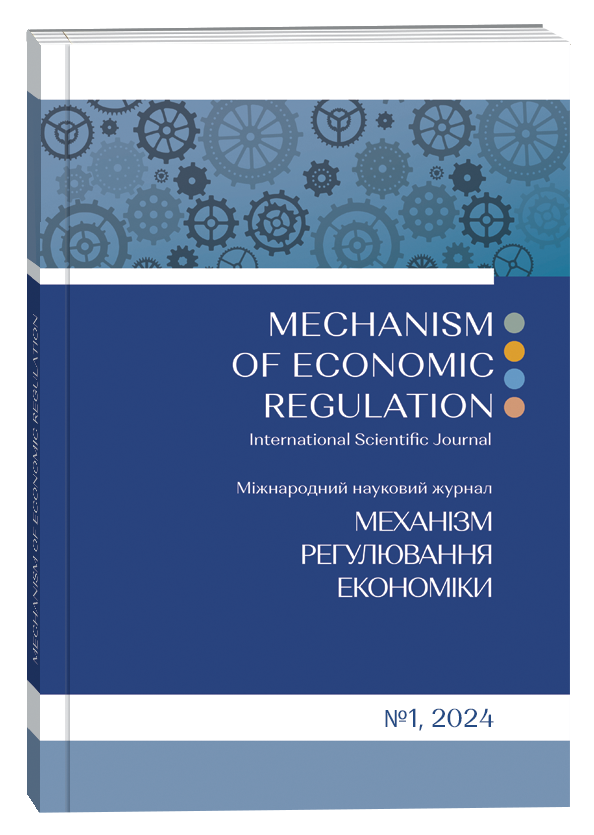THEORETICAL JUSTIFICATION OF THE PSYCHOLOGICAL AND ECONOMIC APPROACH IN THE STUDY OF PRICE DYNAMICS ON THE INTERNATIONAL FINANCIAL MARKET
Abstract
The article explores the theoretical justification of price behaviour in international financial markets and demonstrates the evolution of economic thought regarding this issue. There are numerous investment theories that explain, either fully or partially, the reasons for price changes and the high volatility of international financial markets. Most of them are based on the hypothesis of efficient markets and the rational behaviour of all participants. However, widely accepted theories do not always work and often prove to be ineffective. The existence of both short-term and long-term trends, successful forecasts, and the use of technical and fundamental analysis by investors and other participants cannot be explained based on the traditional approach. Contradictory theoretical justifications of price dynamics for various financial assets encourage the search for new alternative explanations, including the consideration of behavioural finance theories. Several common characteristics between alternative theories and behavioural finance are identified. The psychological aspects of price behaviour are under-researched, hindering the discovery of the true nature of market dynamics. The assumption is made that behaviourism most accurately describes and explains the existence of trends, irrational behaviour of individuals and groups, and more. This is the only way to explain the popularity of both fundamental and technical analysis, which contradict the market efficiency theory. This fundamentally changes the perception of financial markets and challenges the effectiveness of widely accepted tools of analysis based on probability theory and game theory. An interdisciplinary approach, combining psychological and economic methods of analysis to study price dynamics in international financial markets, may prove to be the most effective in the current conditions of financial globalization. Thus, the market is considered inefficient, and the behaviour of its participants is considered irrational, identified as one of the main reasons for the inefficiency of analysis and forecasting tools based on widely recognized investment theories.
References
Fama E.F. Foundations of finance: portfolio decisions and securities prices. New York : Basic Books, 1976. 395 p.
Fama E.F. Market efficiency, long-term returns, and behavioural finance. Journal of financial economics. 1998. No. 9. P. 283–300.
Muth J.F. Rational expectations and the theory of price movements. Econometrica. 1961. No. 29. P. 315–335
Lucas R. Expectations and the Neutrality of money. 1972. No. 4. P. 103–124
Sargent T.J. Some unpleasant monetarist arithmetic. Federal Reserve bank of Minneapolis quarterly review. 1981. No. 5. P. 1–17
Lo A. Stock market prices do not follow random walks: evidence from a Simple specification test. Review of financial studies. 1988. No. 1. P. 41–66
Карпов А.В. Психологія рефлексивних механізмів діяльності. 2004. 424с.
Soros G. The Alchemy of Finance. John Wiley & Sons Inc. 2003. 416 p.
Роговська-Іщук, Ірина Володимирівна. Технічний аналіз на міжнародному валютному ринку: дис. канд. екон. наук: 08.00.02; Терноп. нац. екон. ун-т. Тернопіль, 2009. 315 с.
Шаманська Н., Шаманська О., Теорія поведінкових фінансів: генезис та еволюція. Світ фінансів. 2015. № 1. С. 173–184.
Fama, E. (1976). Foundations of finance: portfolio decisions and securities prices. New York: Basic Books. 395p.
Fama, E. (1998). Market efficiency, long-term returns, and behavioural finance. Journal of financial economics, no. 9, pp. 283–300.
Muth, J. (1961). Rational expectations and the theory of price movements. Econometrica, no. 29, pp. 315–335
Lucas, R. (1972). Expectations and the Neutrality of money, no. 4, pp. 103–124
Sargent, T. (1981). Some unpleasant monetarist arithmetic. Federal Reserve bank of Minneapolis quarterly review, no. 5, pp. 1–17
Lo, A. (1988). Stock market prices do not follow random walks: evidence from a Simple specification test. Review of financial studies, no. 1. pp. 41–66.
Karpov, A. (2004). Psykholohiia refleksyvnykh mekhanizmiv diialnosti. p. 424. [in Ukrainian].
Soros, G. (2003). The Alchemy of Finance. John Wiley & Sons Inc. 416 p.
Rohovska-Ishchuk, I. (2009). Tekhnichnyi analiz na mizhnarodnomu valiutnomu rynku: dys. kand. ekon. nauk: 08.00.02; Ternop. nats. ekon. un-t. Ternopil. p. 315. [in Ukrainian].
Shamanska, N., Shamanska, O. (2015). Teoriia povedinkovykh finansiv: henezys ta evoliutsiia. Svit finansiv, no. 1, pp. 173–184. [in Ukrainian].


